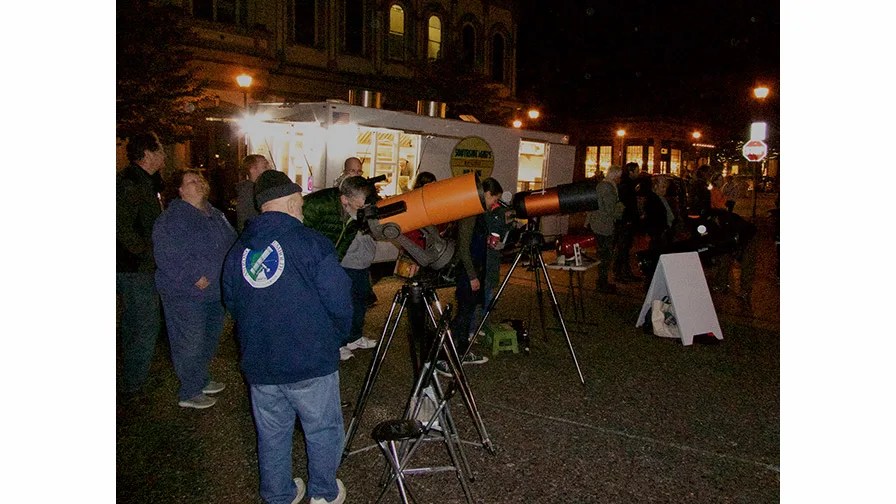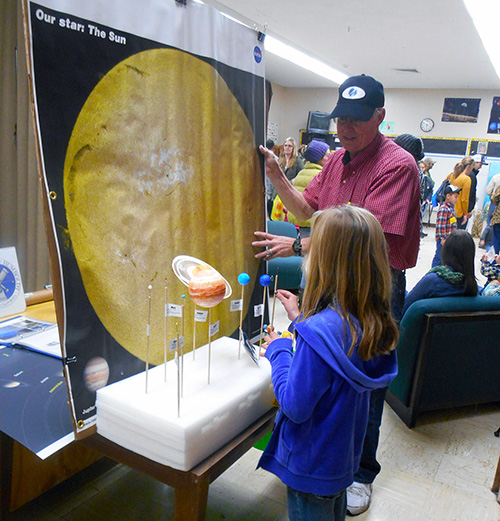by Dave Prosper of the Astronomical Society of the Pacific
Astronomy is awesome! It seems that every day there is another bit of incredible news or an amazing image from a telescope or space probe from the universe around us! Did you know that there are people living right in your own community who can help bring the wonders of the universe to Earth? If you're looking to bring a dash of space science to a group you work with or serve, such as a local troop of Scouts, a library, museum, a local science fair or other community events, you can ask your local astronomy club for help!
Amateur astronomers are everywhere. Many astronomers love to set up their telescopes for their communities and perform astronomy outreach, bringing the stars to folks at nearby parks, libraries, schools, and even sidewalks! Astronomy clubs that are members of the Night Sky Network outreach program also have access to additional materials and tools to help bring NASA science to their communities and often bring fun demonstrations of astronomical phenomena like eclipses, meteorites, cratering, and comets with them to their events.
As you may have already guessed, planning an astronomy outreach event doesn’t necessarily involve just telescopes. Each astronomy club and amateur astronomer has their own style of outreach, and you should make sure to communicate with each other to ensure both parties' expectations are fully understood before holding an event. Giving your potential guest astronomers important information up front helps smooth out the planning process to help make your astro event a success.
Finding a Club
You can find astronomy clubs by searching the NASA Night Sky Network website at nightskynetwork.org Put your local address into the “Clubs & Events” section to see who is near you! Get in touch with them by clicking on the club name and then on the contact link for that club.
Contact a Club
When contacting a club for an event, make sure to have the following info handy and keep a few considerations in mind:
Schedule well in advance. Contact the club well ahead of time. Try to give them at least a month, if not more. Many clubs only have a few dedicated volunteers for outreach events and need to plan well in advance to make sure they have enough members and time to ensure a quality event.
- When is the exact time and date?
- How much setup time do the astronomers have? Some demos and telescopes take a while to set up and get positioned properly. Also, even though the event may be scheduled for night, it's much easier for the members to set up before sunset, when there is still plenty of light outside to help them fine-tune their equipment.
- Is there a backup date in case of poor weather?
What type of event is it? Is it a science, fair, Scouts camp, community event, or something else? This helps club members plan what they will be doing at the event.
Who is this event for, and how many will be there? Let the club know their potential target audience and how many people to expect. Will it be for children? Young adults? Senior citizens? All-ages? Dozens of people, or hundreds? A club would need to know these details in advance to plan what they will observe, and make certain they have enough members and additional support to make the event a success.
Where is the event location? Include not just the address, but extra information about the location that the club volunteers may find useful. Are there special access considerations? Is there access to electricity or internet nearby? Is there a lot of direct light pollution, buildings, trees, or hills blocking the potential view? Sometimes a club member may scout out a location in advance with you just to make sure the location will work for stargazing.
Who should they contact, and what is their preferred contact information? In addition to your own info, is there a backup person in case you can’t make it? Is there a person in charge of the event itself, a custodian, or other handy person that can help club members with basic issues at the event space?
Helping a Club at the Event
Make sure you help your guest astronomer out by ensuring they have easy access to your event space, and if possible, provide them with extra help in setting up and tearing down, along with enough time.
Crowd control and clear guidelines for your visitors are essential for a smooth event. Remind people not to touch or crowd the telescopes. If you need to light the area choose dim red light; red light, as long as it is not overly bright, does not hurt night vision. Possibly the most important guideline for visitors is: No flash photography!
One bonus that is always appreciated: snacks and hot drinks like tea, coffee, or hot chocolate. These are the key to an astronomer's heart! A spot to warm up and take a short break if the night is long is also very much appreciated.
Thanking a Club
Thank your guest astronomers after their visit! A thank-you card or email will really help. Of course, a shout-out in your social media, if applicable, is fantastic. If you have any photos or thankful comments from guests, sharing those with your guest astronomers after the event is always appreciated. Clubs often put these quotes and pictures in their own newsletter and social media as well in order to thank their own volunteers and encourage new folks to sign up for more outreach opportunities!
Take a look at the handout of best practices for partnering with Night Sky Network clubs as well as NASA Solar System Ambassadors.






























